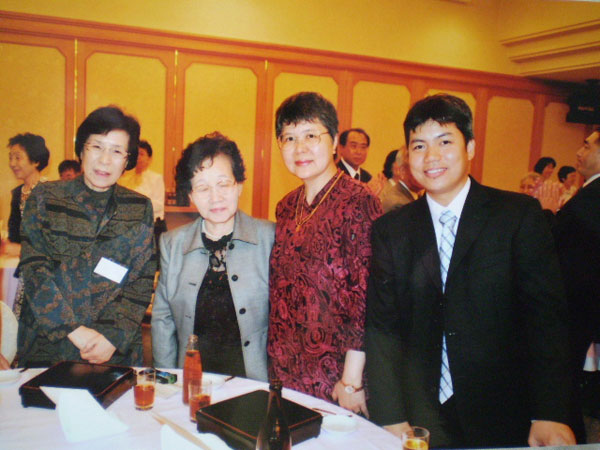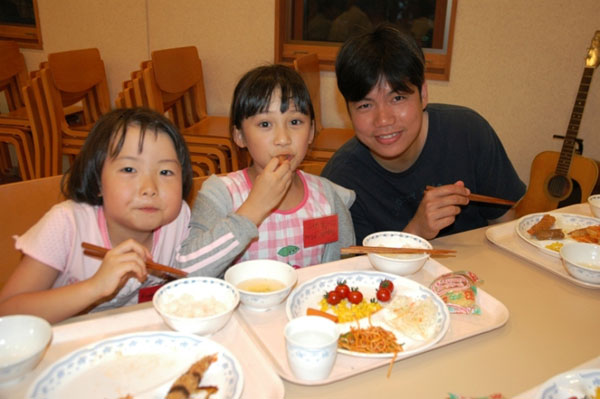A Taste Of A Missionary Journey
By Nelson A. Barbarona SVD
Frater Nelson A. Barbarona is a Divine Word seminarian on his Overseas Training Program in Japan. He is from Bohol and has his own blog, Nelson’s Missionary Journey. ‘Frater’ is the Latin for ‘Brother’ and is the title used by SVD seminarians in vows.
 Japan is a country of few Christians, particularly Catholics. As far as my little knowledge is concerned, Japan in its refusal to be conquered by the different religious orders, persecuted quite a number of religious missionaries and lay persons including the first Filipino Martyr, Saint Lorenzo Ruiz. On 24 November last year 187 martyrs were beatified in Nagasaki City. Despite the persevering efforts of the religious missionaries to spread Christianity, most Japanese remained firm in their traditional belief, Shinto, which eventually became the national religion until Buddhism was introduced in the pre-war period. Today, although the system has changed, Shinto and Buddhism remain the dominant religions in the country. Temples and shrines are the hottest tourist attractions in the country especially in places rich in Japanese history and tradition. One famous religious tradition is the ‘matsuri’ or festival. There seems to be one somewhere or other in Japan throughout the year.
Japan is a country of few Christians, particularly Catholics. As far as my little knowledge is concerned, Japan in its refusal to be conquered by the different religious orders, persecuted quite a number of religious missionaries and lay persons including the first Filipino Martyr, Saint Lorenzo Ruiz. On 24 November last year 187 martyrs were beatified in Nagasaki City. Despite the persevering efforts of the religious missionaries to spread Christianity, most Japanese remained firm in their traditional belief, Shinto, which eventually became the national religion until Buddhism was introduced in the pre-war period. Today, although the system has changed, Shinto and Buddhism remain the dominant religions in the country. Temples and shrines are the hottest tourist attractions in the country especially in places rich in Japanese history and tradition. One famous religious tradition is the ‘matsuri’ or festival. There seems to be one somewhere or other in Japan throughout the year.

Nelson and parishioners
I have been here in Japan for more than two years now. I was given the opportunity to savor missionary life through the OTP (Overseas Training Program) of the Society of the Divine Word (SVD) and selected Japan as my one and only option to experience a missionary journey. At the beginning of my preparation, I thought it would be so easy to enter Japan knowing that I have an established organization as my sponsor. Yet, unexpectedly, it almost made me give up and leave the seminary. It took me four long months of waiting before I could apply for my visa.

Nelson and Japanese kids
When I reached Japan, one of my regrets was that I hadn’t studied Japanese while waiting for my papers. At least I could have had some understanding before I get there and maybe speak even a little Japanese. My frustrations seemed to be a burden especially when three days after my arrival, I had to go to a Japanese language school. The first class was definitely a nightmare. I didn’t understand anything. The teacher spoke only Japanese and could hardly understand English. On my way home, the first time I used the subway train was also a humiliating experience. I was so confident that the station where I got off was the same station where I had got the train going to the school. But it wasn’t! I was like an army going to a war empty-handed. Thanks to the station official who, despite his meager English, by using some sign language was able to direct me to our house.
There were lots of strange things I saw and encountered during the first two weeks of my stay. In other words, I was experiencing culture shock. I was amazed to see young girls wearing shorts and loose shirts even in winter. I couldn’t imagine how they tolerated the coldness of the weather for the sake of fashion. Another thing was the hair styles of both young men and women. It seemed as if they had been watching anime or playing video games so often that they even imitated the hair styles of the characters there. It was so weird.
Because I was new to the environment, I also had to adjust to certain mechanisms in order to adapt to the new culture. What made it so difficult was the ‘inverted’ way of thinking as manifested in the Japanese language. I was used to the thought patterns of American English. I had to reorganize my brain and switch the way I thought. From that standpoint, even if I used a textbook in English, I still got a headache since the translation or explanation was often so awkward or sounded awful and grammatically illogical. I’m not saying that I have very good English. But being new to Japanese I had to rely on the explanations and translation in the textbook to understand. The day ended in frustration.
Many days had gone by and the so-called honeymoon stage was over. Due to international aspect of our community, I felt I was alone moving around and doing things on my own. I felt lonely and dry. Although there are Filipino SVDs in Japan, I couldn’t contact them easily because of their different assignments. They were busy all the time. However in the midst of the loneliness, I found a group of Filipinos in one of the churches where I regularly attended Mass. The priest who usually celebrated Mass for the international community was an SVD and invited me to join the choir and play the guitar for a couple of Sundays before I was invited to play at a Filipino Community Mass in the diocese. That was the start of my ministry extension although it was strongly discouraged by my director because my priority was to study Japanese. I was also reminded by a priest not to be so close to the Filipinos or else my Japanese would be in trouble. This reminder was really true and I can only guess as to how my Japanese is progressing right now. It is also true that studying Japanese isn’t easy. All kinds of pressures, psycho-emotional stress and many sleepless nights of review and practice of ‘kanjis’, the Chinese characters used in writing Japanese were all absorbed by my body during those times. Well, as I said to myself, this is what I had opted for and whether or not I regretted it, I was at the stage where I had to believe that I could overcome this hardship through the aid of the Almighty. Here in Japan I had to be independent. In spite the fact that I was living in a community, I had to be careful not to disturb the others. I had nothing to rely on other than God’s providential care and assistance.
The daily routine made me feel bored and dry. I felt that prayers or daily Mass weren’t enough to sustain a week’s bundle of home works and quizzes. My body needed to cool down and my spirit needed enrichment. I was longing for something and I believe it was my weekly apostolate when I was still in the Philippines. Luckily, I was again invited to play the guitar at a Filipino Mass in one of the parishes. I gladly accepted the invitation although my director allowed me only reluctantly. Due to my insistence and mission-oriented explanation I got his ‘Yes’ with the same reminders. After that, I got invitations to give a talk at a Lay Formation Seminar and to attend a regular Bible Sharing meeting. This helped ease the pressures at school and gave a chance to interact with the Filipinos in the diocese. I became their friend and sometimes they invited me for lunch or dinner. At least I had the opportunity to talk to them and listen to their stories about their dire sacrifices, daily work stresses and family-related issues. In one way or another, I was able to give them some good insights and enlightenment with the hope that God might bless them in everything they do.
I considered being present and available to listen to them as already a missionary journey. I didn’t realize that it also affected my personal and intellectual being as I too had to face my own concerns and issues.
Unlike Filipinos, Japanese people do not mind who you are, especially if you are a foreigner. Our family-oriented mind is definitely different from the Japanese way of thinking. For their part, it is their work that is the most important for if they don’t work they have nothing to live on. Family is only their second priority. The patriarchal culture is very evident in Japanese families. This causes problems for Filipino women who are married to the Japanese men. Although there are good husbands who are well-educated and understand certain situations, there are still serious cases of quarrels that lead to divorce.
From such experiences, from the preparation up to the present, I can draw the conclusion that God prepared me by delaying my papers in order to realize the outcome of my ministry in the future whether here in Japan or in another country. Here in Japan, I realize how difficult it is to live in a culture that is so deep and traditional. It’s not about doing missionary work to convert people but merely giving of one’s time to listen to and encourage the broken-hearted. The Japanese are also known for their ‘gaman wo suru’, which means patience or endurance. It is where I got a fruitful lesson to become calm and patient, qualities that a missionary has to have to be effective in the ministry. Humility also has to go with these two important qualities especially that I am studying language.
In spite of my weaknesses and shortcomings, God never leaves my side. He instead opens my heart and mind not to lose hope and to entrust everything to Him. He gives me the opportunity to stand and pick up the pieces broken by uncertainties. ‘For by his grace He stretches out to us his saving hands every time we fall and every time we tend to turn our back on Him. Let us just remember that God will never abandon us and He will continue to love us till the end of time.’
You may contact the author at nbarbarona@yahoo.com
Facts About Church in Japan
Population: 127,851,000; Catholics: 509,000; Percentage of population: 0.40.Number of archdioceses: 3, dioceses: 13.
Archdiocese of Tokyo: 18,408,577 people, 89,409 Catholics, 0.49%.
Archdiocese of Nagasaki: 1,500,249 people, 67,728 Catholics, 4.51% (highest).
Diocese of Takamatsu: 4,125,762 people, 5,407 Catholics, 0.13% (lowest).
Source: www.catholic-hierarchy.org . Statistics as of 2004, taken from Annuario Pontificio 2007. This is published by the Vatican each year.
Taro Aso, the previous prime minister of Japan, was the first Catholic, though not the first Christian, to hold that office.
